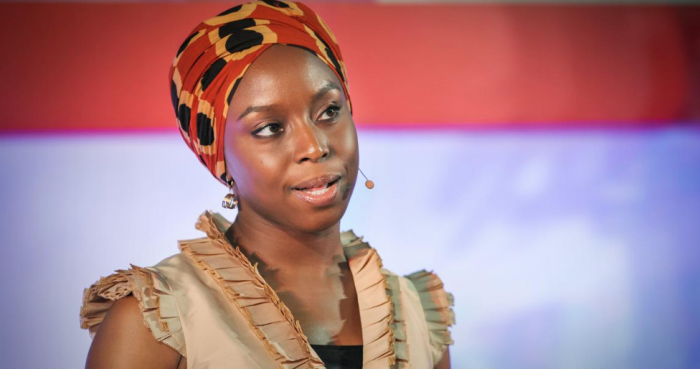It seems I am always late to the game—is that the saying?—when it comes to discovering wonderful authors.
It takes a while for writers to hold my notice, not that my attention is anything grand or worth noting, but I’ve read this author a couple times, watched one of her TED Talks in college, and it was this week that I became completely infatuated.
Last night, with dry, red, strained eyes I finished Half of a Yellow Sun, by Chimamanda Ngozi Adichie.
Any words I offer to describe the journey this book takes the reader through will not do it justice. I hesitate to offer a review of the story, in the fear that it won’t adequately convey the profound marvel that her writing is, what her words are.
What I love about novels is—in your heart—you become the characters; I find in movies that it’s easier to disassociate, to view the people on screen as separate; but, in a novel, you truly live and feel each character’s experience.
So, for the past week, I was a 13-year-old poor Nigerian boy who moves from his village to work for a university professor and marvels at a refrigerator for the first time; a beautiful, intelligent, rich, Igbo woman exploring the two sides of her identity: village family woman, intellect, university teacher, and Western-influenced; and a white, British writer who falls in love with a sarcastic, brave Nigerian business woman, who falls in love with Nigeria and Biafra.
All three witness the horrors of an Igbo massacre, the faith of independence, the scarcity of war, the fear of soldiers, the consequences of Western influence, the enjoyment of a fusion of Western and African culture, the naiveté of intelligence, the dire importance of education—all face the question: who do we turn into during war?
When I first become infatuated with an author, I consume their words like an endless elixir—intoxicated and invigorated by their composition of letters.
There is nothing quite like an eloquently woven thread of words to awe-inspire, shatter the doors of our perceptions, and make us pick up the pieces of our life in wonder, like we’re seeing clearly for the first time.
Chimamanda Ngozi Adichie is a writer who could change you in a sentence.
I hope her words inspire a fire within you, shatter your inner stories of how things are, and shakes up your life—as she did mine.
May it be of benefit.
Here’s a collection of some of her words, may you fall in love:
“I often make the mistake of thinking that something that is obvious to me is just as obvious to everyone else.”
“Gender as it functions today is a grave injustice. I am angry. We should all be angry. Anger has a long history of bringing about positive change. But I am also hopeful, because I believe deeply in the ability of human beings to remake themselves for the better.” ~ We Should All Be Feminists
“’You must never behave as if your life belongs to a man. Do you hear me?’ Aunty Ifeka said. ‘Your life belongs to you and you alone.'” ~ Half of a Yellow Sun
“Our histories cling to us. We are shaped by where we come from.”
“You can’t write a script in your mind and then force yourself to follow it. You have to let yourself be.” ~ Half of a Yellow Sun
“Richard exhaled. It was like somebody sprinkling pepper on his wound: Thousands of Biafrans were dead, and this man wanted to know if there was anything new about one dead white man. Richard would write about this, the rule of Western journalism: One hundred dead black people equal to one dead white person.” ~ Half of a Yellow Sun
“There are two answers to the things they will teach you about our land: the real answer and the answer you give in school to pass. You must read books and learn both answers.”
“If she likes makeup, let her wear it. If she likes fashion, let her dress up. But if she doesn’t like either, let her be. Don’t think that raising her feminist means forcing her to reject femininity. Feminism and femininity are not mutually exclusive.”
“Look at you. You’re the kindest person I know. Look how beautiful you are. Why do you need so much outside of yourself? Why isn’t what you are enough?”
“We teach girls to shrink themselves, to make themselves smaller. We say to girls, you can have ambition, but not too much. You should aim to be successful, but not too successful. Otherwise, you would threaten the man. Because I am female, I am expected to aspire to marriage. I am expected to make my life choices always keeping in mind that marriage is the most important. Now marriage can be a source of joy and love and mutual support but why do we teach girls to aspire to marriage and we don’t teach boys the same? We raise girls to see each other as competitors not for jobs or accomplishments, which I think can be a good thing, but for the attention of men. We teach girls that they cannot be sexual beings in the way that boys are.” ~ We Should All Be Feminists
“The only reason you say that race was not an issue is because you wish it was not. We all wish it was not. But it’s a lie. I came from a country where race was not an issue; I did not think of myself as black and I only became black when I came to America. When you are black in America and you fall in love with a white person, race doesn’t matter when you’re alone together because it’s just you and your love. But the minute you step outside, race matters. But we don’t talk about it. We don’t even tell our white partners the small things that piss us off and the things we wish they understood better, because we’re worried they will say we’re overreacting, or we’re being too sensitive. And we don’t want them to say, Look how far we’ve come, just forty years ago it would have been illegal for us to even be a couple blah blah blah, because you know what we’re thinking when they say that? We’re thinking why the fuck should it ever have been illegal anyway? But we don’t say any of this stuff. We let it pile up inside our heads and when we come to nice liberal dinners like this, we say that race doesn’t matter because that’s what we’re supposed to say, to keep our nice liberal friends comfortable. It’s true. I speak from experience.” ~ Americanah
“The single story creates stereotypes, and the problem with stereotypes is not that they are untrue, but that they are incomplete. They make one story become the only story.”
“Of course I am not worried about intimidating men. The type of man who will be intimidated by me is exactly the type of man I have no interest in.”
“I recently spoke at a university where a student told me it was such a shame that Nigerian men were physical abusers like the father character in my novel. I told him that I had recently read a novel called American Psycho,and that it was a shame that young Americans were serial murderers.”
“How easy it was to lie to strangers, to create with strangers the versions of our lives we imagined.”
“What struck me—with her and with many other female American friends I have—is how invested they are in being “liked.” How they have been raised to believe that their being likable is very important and that this “likable” trait is a specific thing. And that specific thing does not include showing anger or being aggressive or disagreeing too loudly. We spend too much time teaching girls to worry about what boys think of them. But the reverse is not the case. We don’t teach boys to care about being likable. We spend too much time telling girls that they cannot be angry or aggressive or tough, which is bad enough, but then we turn around and either praise or excuse men for the same reasons. All over the world, there are so many magazine articles and books telling women what to do, how to be and not to be, in order to attract or please men. There are far fewer guides for men about pleasing women.”
“I like politics and history and am happiest when having a good argument about ideas.”
And a bonus, her TED Talk, The Danger of a Single Story:











Read 8 comments and reply